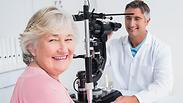

The Israeli breakthrough that will prevent blindness in the elderly
In a ground-breaking experiment, researchers have succeeded in preventing blindness in patients using embryonic stem cell transplantation; Prof. Benjamin Rubinoff of Hadassah: 'If we implant the cells at an early stage of the disease, we might be able to prevent millions of elderly people from losing their sight.'
Retinal degeneration in older age is a particularly common disease in the Western world. 30 percent of adults older than 75 suffer from it, and 6 to 8 percent of them suffer from total vision loss.
Embryonic stem cells are harvested from in vitro fertilized embryos. When the couple decides they do not want to expand the family unit anymore, frozen embryos can be used to isolate the stem cells. These cells are unique because during pregnancy they are the ones that actually form the body of the fetus, and they can serve as a source of transplantation for every cell in the human body.
Prof. Benjamin Reubinoff, director of the Hadassah Center for Embryonic Stem Cell Research and an expert in obstetrics and gynecology, founded a company called Cellcure, which focuses on developing embryonic stem cell transplantation in patients with incurable diseases in the nervous system and the eyes.
The researchers had to develop a culture from the embryonic stem cells that would contain only the pigment cells of the retina and prove that these cells were safe and effective in experiments in mice and rats. After obtaining the approval of the Ministry of Health and the Food and Drug Administration, it was decided to conduct a trial in human subjects.
Prof. Reubinoff and Prof. Eyal Banin, director of the Center for Retinal Degeneration Diseases at Hadassah's Department of Ophthalmology, began performing transplantations in five patients. Using imaging, they found that the transplanted cells were successfully absorbed into the retina.
"This is a great achievement for us. The vision of the elderly has remained stable and has not deteriorated as it would have without the transplant," explained Prof. Reubinoff. "If the treatment is proven to be effective, we will implant the cells at an early stage of the disease, thereby preventing millions of elderly people around the world from losing their sight."
Despite the success of the trial, the researchers believe it will take more time for the treatment to be available to all patients. "We will also have to prove safety and efficacy before we make it effective for everyone," concluded Prof. Reubinoff.
(Translated and edited by N. Elias)
















